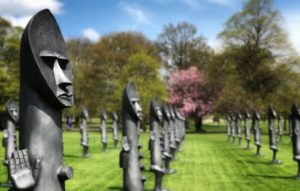Cultural Dimension of Development: Culture has been defined differently by various scholars. Perhaps this is due to the complex and heterogeneous nature of culture as an all-embracing phenomenon covering all spheres of human life in all societies.

Cultural dimension of development
The term, culture, derives its meaning from the Latin word “Colore”, which means to care, nurse or cultivate. Thus, culture helps, on one hand, to develop, educate and integrate into individuals’ appropriate social values and, on the other hand, incorporate individuals into society as integral parts of the whole society.
In essence, culture is the sum total of the ways in which society preserves, identifies, organizes, sustains and express itself. In terms of value, culture is the totality of the values that society upholds, and by which its members identify themselves and are also identified by non-members. Elements of culture include:
- Language
- History
- Conceptions of rights and duties
- Ritualceremonies
- Philosophy
- World views
- Religious beliefs andmorality
- Signs andsymbols
- How families, clans and society at large arestructured
- The legalsystem
- Indigenous skills andtechnologies
- System ofeducation
- Forms ofleadership
From the above, culture may be rightly described as the totality of all that humans, by their freewill and competence, have created. It is a product of human activities, and a device developed by people over time in their efforts to cope with the vagaries of life, and is transmitted from generations to generations.
From the Marxist-Leninist perspective, culture is a specific attribute of society that reflects the level of historical development achieved by man and which is determined by his relationship with nature and society. Hence, culture is a social heritage that is transmitted from one generation to another.
⇐Cultural Dimension of Development
From the anthropological perspective, culture is seen as a complex whole that includes knowledge, belief, arts, customs, morals, and other capabilities and habits acquired by people through their social interactions.
This broad conception of culture covers all aspects of human activities. It goes on to describe culture as the shared way of life of a people that includes their values, beliefs and norms transmitted within a given society from generation to generation. Culture thus becomes the by-product of the relationships between humans in society. It sets standards, rules or norms which people are expected to conform to in society.
From the above accounts of culture, it can be distilled that it has two basic components, the material and non-material. The material aspect of culture covers all the tangible products of human activities in society.
This would include tools, weapons, buildings, clothes, works of arts, and any other item derived from human technological intervention. The non-material aspect of culture refers to the non- perceptible but operative or influential human creations perceptible in the human minds that guide human society in the form of ideas.
These creations are abstract and include societal values, beliefs, norms, knowledge, religion, tradition, custom, music, myth and morality. They confer identity, define a people’s uniqueness and world view, as well as serve a basis of unity.
With regards to the relationship between culture, especially traditional African culture, and development, there are two basic positions. First, there is the opinion that African culture constitutes a major obstacle to development in Africa. Within the context of African philosophy, this opinion is expressed by the crop of African philosophers known as the modernists.
⇐Cultural Dimension of Development
They contend that for African societies to develop, much of the traditional African culture must be jettisoned in favour of Western logic and science. In their opinion, African culture is primitive and a major obstacle to development. Hence, for Africa to develop, its traditional ways, values and beliefs must accommodate innovative views and methods of doing things.
Given the above negative perception of traditional African culture, advocates of the position that culture has an indispensable role to play in the quest for development are confronted with the great challenge of justifying their position.
Known as the culturalists, these scholars affirm that culture is an essential part of development, and does not necessarily constitute a barrier to development, even when it needs to be transformed to accommodate good innovation and techniques required for development. Advocates of this view include Olusegun Oladipo, Hammed Miske and Kwame Gyekye. They all acknowledged the vital role of culture in development.
